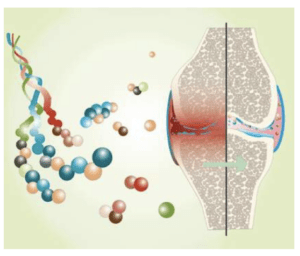Improving joint health: the role of collagen in pet food

Exploring the benefits of collagen in pet nutrition reveals Hydro-P Premium’s role in improving canine joint health.
Osteoarthritis is a common joint disease in dogs, characterized by degeneration of the joint cartilage and continuous inflammation. As a consequence, dogs experience pain and lameness in the affected limbs. Dietary components play an important role in managing this disease, by influencing inflammation and wear.
The role of collagen
Collagen hydrolysates could play a role in the nutritional support of osteoarthritis patients. This dietary supplement provides building blocks for the collagen molecule, an essential part of the joint cartilage.
It is hypothesized that ingestion of collagen hydrolysates supports the renewal of cartilage, and may even reduce inflammation, improving the mobility of dogs with osteoarthritis as well as their welfare by reducing joint pain.
What is Hydro-P Premium?
Hydro-P Premium is a collagen hydrolysate. Hydrolysis of collagen produces gelatin, and then small peptides. These peptides – collagen hydrolysates – are highly digestible and easily absorbed in the gastro-intestinal tract.
Hydro-P Premium has a variety of uses for pets:
- Supports tissue structure and joint function
- Supports long-term mobility and well-being of cats and dogs
- Maintains healthy skin and coat
The research
Two pilot studies suggest that supplementing arthritic dogs with Hydro-P Premium can improve the characteristics of mobility, e.g. activity (vitality), stiffness and lameness, and potentially suppress the inflammatory component.
Based on these data, a collaboration was started between Darling Ingredients / Sonac and the University of Utrecht to study the effectiveness of collagen hydrolysates supplied via a Hydro-P Premium enriched pet food to dogs with osteoarthritis (in a randomized clinical trial).
It is envisioned to gain a holistic understanding of the impact of collagen hydrolysates on dog patients with osteoarthritis, both theoretically and clinically.

After ingestion and absorption of collagen hydrolysates, the released peptides travel to the joint and potentially reduce breakdown of cartilage and mitigate inflammation.
